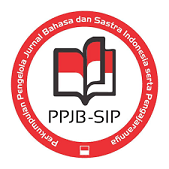PENGGUNAAN MEDIA TAYANGAN TELEVISI “PADA ZAMAN DAHULU” UNTUK MENINGKATKAN KEMAMPUAN MENCERITAKAN KEMBALI ISI CERITA FABEL PADA SISWA KELAS VII B SMP NEGERI 3 MENGWI
DOI:
https://doi.org/10.23887/jjpbs.v7i2.14356Abstract
Penelitian Tindakan Kelas (PTK) ini bertujuan untuk mengetahui (1) langkah-langkah penggunaan media tayangan televisi “Pada Zaman Dahulu” dalam meningkatkan kemampuan menceritakan kembali isi cerita fabel, (2) hasil penggunaan media tayangan televisi “Pada Zaman Dahulu” dalam meningkatkan kemampuan menceritakan kembali isi cerita fabel, (3) respons siswa terhadap penggunaan media tayangan televisi “Pada Zaman Dahulu” dalam meningkatkan kemampuan menceritakan kembali isi cerita fabel. Subjek dalam peneliitian ini yaitu guru bahasa Indonesia dan siswa kelas VII B SMP Negeri 3 Mengwi. Objek dalam penelitian ini yaitu langkah-langkah penggunaan media tayangan televisi “Pada Zaman Dahulu”, kemampuan hasil belajar siswa dalam menceritakan kembali isi cerita fabel dan respons siswa terhadap pengunaan media tayangan televisi “Pada Zaman Dahulu”. Pengumpulan data dalam penelitian ini menggunanakan metode (1) Observasi, (2) Tes, (3) Angket, dan (4) Wawancara. Data yang diperoleh dianalisis dengan menggunakan tehnik diskriptif-kualitatif dan deskriptif-kuantitatif. Hasil penelitian ini menunjukan bahwa (1) terdapat tiga langkah dalam pembelajaran menceritakan kembali isi cerita fabel yaitu pendahuluan, inti, dan penutup, (2) kemampuan siswa dalam menceritakan kembali isi cerita fabel meningkat dengan perolehan skor rata-rata refleksi awal yaitu 59,35 (kurang), menjadi 70,11 (cukup) pada siklus I dan menjadi 81,41 (baik) pada siklus II, dan (3) siswa memberikan respons sangat positif terhadap penggunaan media tayangan televisi “Pada Zaman Dahulu” untuk meningkatkan kemampuan siswa dalam menceritakan kembali isi cerita fabel dengan skor rata-rata respons siswa 30,88 (positif) pada siklus I menjadi 32,41 (sangat positif) pada siklus II.Kata Kunci : Tayangan Televisi, Menceritakan Cerita Fabel
This classroom action research (PTK) aimed for investigating 1) the steps to use television program “Once Upon a Time” to improve re-telling fable’s content’s skill. 2) result of using television program “Once Upon a Time” to improve re-telling fable’s content’s skill. 3) student’s response towards the use of use television program “Once Upon a Time” to improve re-telling fable’s content’s skill. The subject of this study is the teacher of Bahasa Indonesia and students of class VII B in SMP N 3 Mengwi. The objects of this study are the steps of using television program “Once Upon a Time”, the ability of student learning outcomes in retelling the contents of fable stories, and student’s response towards the use of use television program “Once Upon a Time”. Data collection in this research (1) observation, (2) Test, (3) Questionnaire, and (4) Interview. The data were analyzed by using descriptive- qualitative and descriptive-quantitative techniques. The result showed that: 1) There are three steps of re-telling the content of the story such as opening, whilst-activity, and closing. 2) the student’s skill in re-writing the story increased from 59.35 (low) in pre-reflection into 70,11 (satisfactory) in 1st cycle and 81.41 (good) in 2nd cycle. 3) the student’s response towards the use television program “Once Upon a Time” to improve re-telling fable’s content’s skill was positive with the average score 30.08 in 1st cycle into 32.41 in 2nd cycle.
keyword : Television Impressions, Telling Fable Stories
Published
2018-06-25
Issue
Section
Articles
License
Authors who publish with the Jurnal Pendidikan Bahasa dan Sastra Indonesia Undiksha agree to the following terms:- Authors retain copyright and grant the journal the right of first publication with the work simultaneously licensed under a Creative Commons Attribution License (CC BY-SA 4.0) that allows others to share the work with an acknowledgment of the work's authorship and initial publication in this journal
- Authors are able to enter into separate, additional contractual arrangements for the non-exclusive distribution of the journal's published version of the work (e.g., post it to an institutional repository or publish it in a book), with an acknowledgment of its initial publication in this journal.
- Authors are permitted and encouraged to post their work online (e.g., in institutional repositories or on their website) prior to and during the submission process, as it can lead to productive exchanges, as well as earlier and greater citation of published work. (See The Effect of Open Access)







